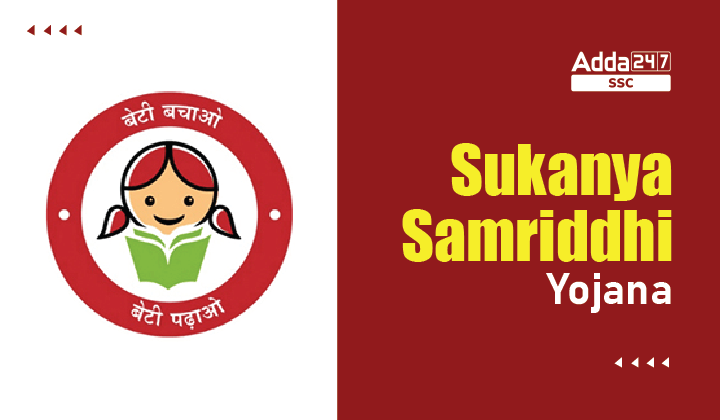Sukanya Samriddhi Yojana
Sukanya Samriddhi Yojana (SSY) is a saving scheme to help the parents of girl child helping to make a bright career for their girl child. It aims to collect the fund to fulfill the expenses of Education, Marriage, and other necessary expenses. Sukanya Samriddhi Yojana is a deposit scheme made especially for the girl child. This scheme was introduced to ensure a financially safe future for the girl child.
Under the Sukanya Samriddhi Yojana, an account in the name of the beneficiary girl child need to be opened in any of the private and public banks for 21 years. The tenure of investment under Sukanya Samriddhi Yojana is 21 years, commencing from the account’s opening date.
Sukanya Samriddhi Yojana Scheme Details
Sukanya Samriddhi Yojana is launched under the Beti Bachao, Beti Padhao campaign to secure the future of girl children financially. The Sukanya Samriddhi Yojana details are given here.
Sukanya Samriddhi Yojana Eligibility
The candidate must fulfill the eligibility criteria mentioned below to become a beneficiary of Sukanya Samriddhi Yojana.
- Parents or legitimate guardians of the girl child are eligible to open a Sukanya Samriddhi account.
- The age of the girl child should be under 10 years at the time of account opening. The account can be operational till the girl child become 21 years old.
- The account opening amount begins from ₹250 and a limit of ₹1,50,000 yearly with ongoing deposits in the products of ₹100.
- A single girl child cannot have numerous Sukanya Samridhhi accounts.
- Only two Sukanya Samriddhi Yojana accounts are allowed in one family.
Sukanya Samriddhi Yojana – Documents Required
The beneficiaries must have the documents listed below to open a Sukanya Samriddhi Account. You need to visit any nationalized banks or post offices with these documents to open an account under this scheme.
- Sukanya Samriddhi Yojana Account Opening Form
- Birth Certificate of the beneficiary girl child.
- Identity Proof
- Other Documents are required as per the rules of particular banks or post offices.
Sukanya Samriddhi Yojana- Interest Rates
The rate of interest will be provided annually. The current rate of interest in your Sukanya Samriddhi Yojana account currently stands at 7.6% p.a. This interest rate is applicable from 1st April 2020 from the rules of govt.
However, if you have deposited between 12th December 2019 to 31st March 2020 then you will earn 8.4% p.a.
a) Interest is payable every year
b) Interest is credited to the account at the end of every financial year
c) Interest rate is decided by the government guidelines and changes every quarter
d) No interest will be provided if the girl becomes a citizen of another country.
Here is a table that shows the interest rates offered by the Sukanya Samriddhi scheme over the years are given here.
| YEAR | RATE % |
| April 2020 – Present | 7.6% p.a. |
| 1 January 2019 – 31 March 2019 | 8.5% p.a. |
| 1 October 2018 – 31 December 2018 | 8.5% p.a. |
| 1 July 2018 – 30 September 2018 | 8.1% p.a. |
| 1 April 2018 – 30 June 2018 | 8.1% p.a. |
| 1 January 2018 – 31 March 2018 | 8.1% p.a. |
| 1 July 2017 – 31 December 2017 | 8.3% p.a. |
| 1 October 2016 – 31 December 2016 | 8.5% p.a. |
| 1 July 2016 – 30 September 2016 | 8.6% p.a. |
| 1 April 2016 – 30 June 2016 | 8.6% p.a. |
| 1 April 2015 – March 31 2016 | 9.2% p.a. |
| 3 December 2014 – March 31 2015 | 9.1% p.a. |
How to Calculate Interest on Sukanya Samriddhi Yojana Scheme?
To calculate our canon, we need to calculate the interest that will be added at the end of the year. You can use the below formula to calculate your interest in Sukanya Samriddhi Yojana Scheme.
I = P(1+R/100) ^N
Where I = Interest
P= Principle Invested
R= Rate of return
N= Number of Years
The compound interest on the SSY account is computed every year. If you do not want to calculate manually, you can check the Sukanya Samriddhi Yojana Calculator available online.
Sukanya Samriddhi Yojana Calculator
Sukanya Samriddhi Yojana scheme allows you to deposit regularly in the account and create a corpus that will be useful to fulfill your girl child’s needs. This investment is very safe as it is financed by the government and has a guarantee of returns. Since it is safe, you can calculate an estimated amount that you can receive once the scheme grows up. For this, you can use the Sukanya Samriddhi Yojana Calculator online.
In the SSY online calculator, you need to enter the investment that you will make every year and the interest rate that is applicable currently in SSY accounts.
The maturity period of the SSY account is pre-defined and is of 21 years.
After entering the details, you will get the required amount which you will receive. For example, if you wish to deposit Rs 12,000 every year then your net amount after 15 years would be Rs 5,27,000.
Sukanya Samriddhi Yojana Post Office
Post Offices are playing important role in the execution of the Sukanya Samriddhi Yojana. The government has launched this scheme in cooperation with Indian Post Offices. Sukanya Samriddhi Yojana scheme can be easily accessible from the post offices. Most of the beneficiaries registered in this scheme through the post office. Sukanya Samriddhi Yojana Post Office account can be opened by giving all the required documents easily.
Sukanya Samriddhi Yojana Online
Sukanya Samriddhi Yojana Online account opening is not yet allowed officially. But the people may access the details of Sukanya Samriddhi Yojana online. It’s a scheme to collect a fund for the girl child to make them financially strong and helps to establish their career.
Sukanya Samriddhi Yojana Benefits
There are many benefits of Sukanya Samriddhi Yojana. The Sukanya Samriddhi Yojana benefits are mentioned below.
High-Interest Rate- Sukanya Samriddhi Yojana offers an outstanding fixed rate of return (currently 7.6% per annum for Q2 FY (2022-23) as compared to other government-backed tax savings programs such as PPF.
Guaranteed Returns- Since SSY is a government-financed scheme, it provides guaranteed returns to its beneficiaries.
Tax Benefit- SSY procures tax deduction benefits under Section 80C up to Rs. 1.5 lakh yearly.
Flexible Investment- One can make a minimum deposit of Rs. 250 yearly and a maximum deposit of Rs. 1.5 lakh in a year. This assures people with different financial standing can invest in the scheme.
The benefit of Compounding- Sukanya Samriddhi Yojana is a great long-term investment scheme as it provides the benefit of annual compounding. So, even small investments will provide great returns over the long term to their beneficiaries.
Convenient Transfer- The SSY account can be freely transferred from one bank/post office to another (bank/post office) in the country in case of transfer of parent/guardian governing the Sukanya Samriddhi Account.
Sukanya Samriddhi Yojana in Hindi (सुकन्या समृद्धि योजना)
सुकन्या समृद्धि योजना Sukanya Samriddhi Yojana in Hindi is explained for ease people to understand the scheme in detail. The people can get Sukanya Samriddhi Yojana Hindi booklet from the banks or post offices.
Sukanya Samriddhi Yojana – FAQs
Que.1 What is the interest rate in the Sukanya Samriddhi Scheme account?
Ans – The interest rate in the Sukanya Samriddhi Yojana account is 7.6% annually.
Que.2 Is Sukanya Samriddhi Yojana only for girl children?
Ans – Yes, Sukanya Samriddhi Yojana is only for girl children.
Que.3 What are the documents required to open Sukanya Samriddhi Account?
Ans – The documents required to open the Sukanya Samriddhi Account are Birth certificates, identity documents, and other documents as per the rules of banks and post offices.



 Upcoming Government Exams, Complete Govt...
Upcoming Government Exams, Complete Govt...
 SSC Exam Calendar 2025–26 Out, Check All...
SSC Exam Calendar 2025–26 Out, Check All...
 RRB JE 2024 Notification, CBT 2 Exam Dat...
RRB JE 2024 Notification, CBT 2 Exam Dat...


